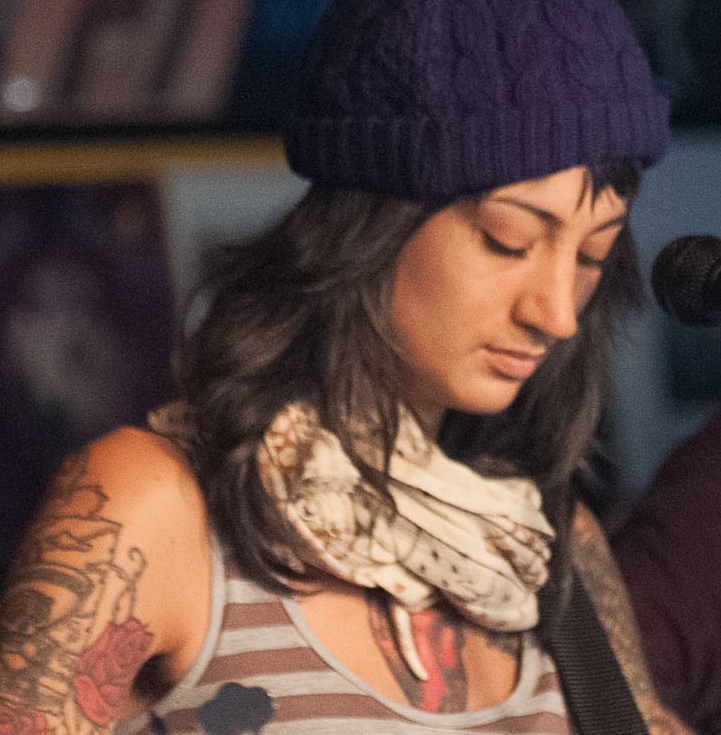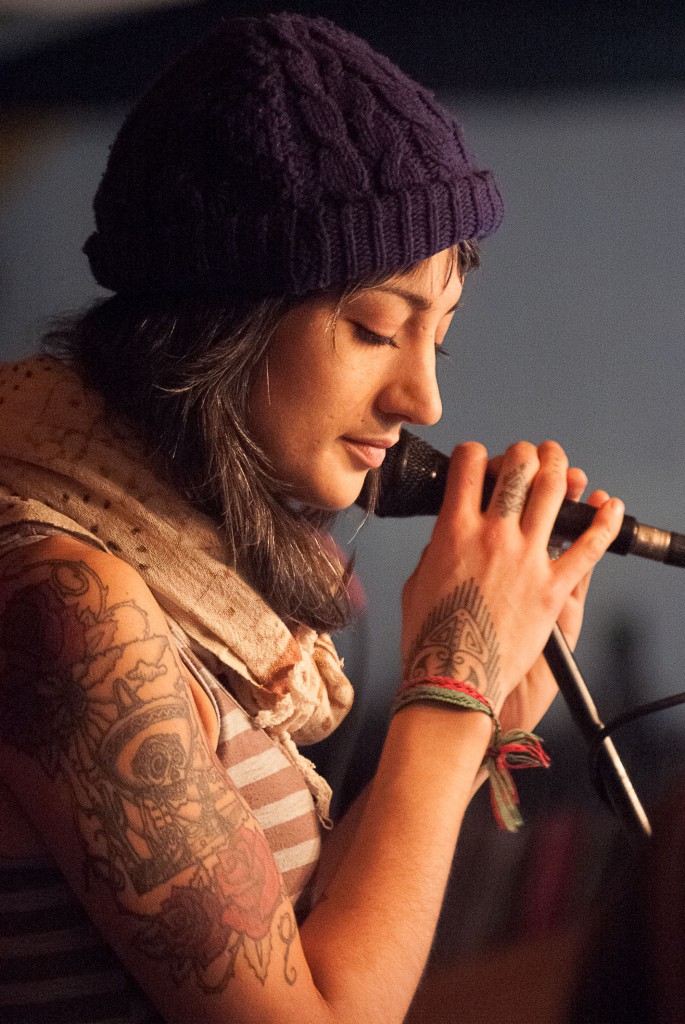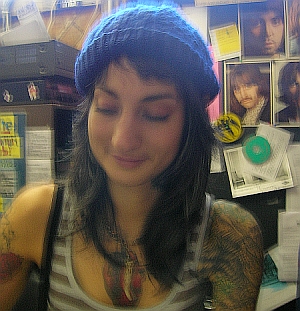It is late February, seasonably chilly and wet. Luz Elena Mendoza and I are sitting amidst the noisy clatter of the busy Barista cafe in Northeast Portland. Luz is the extraordinary vocalist and passionate, shamanic presence fronting the nuevo Latino folk band Y La Bamba. The release of their second album Court the Storm (produced by Steve Berlin of Los Lobos) on February 28th, heralds a new level of excellence within the band. Clever, unique musicianship neatly matches the ineffable majesty of Luz’s timeless voice. I meet with her as she and Y La Bamba prepare to head to Austin to play several events at South by Southwest.
Very tall and slender, longish, straight black hair, swatched in gray, Luz has a location-perfect, life-sized heart embossed upon the book that is her tattooed body. But where her heart truly lies is with her family. She measures the world in family. Her brothers, her immigrant parents. Her family. Music and her family. Mexico and her family. Her culture, her heritage, and her family. The band. It is all family to Luz. It is all interconnected in her world. She is constantly in process, tracing her Mexican American heritage in Oregon back to its cultural headwaters in Mexico.
Luz speaks in a lilting sonorous cadence, in a lulling rhythm very similar to the way she sings. Though her mind works so fast that she often abruptly deserts a thought mid-sentence to change course in some other direction—her passion for the subject matter always burns through with laser-like clarity.
You grew up in California, is that right?
I grew up in Oregon. But I was born in San Francisco and I spent a lot of summers and other times of the year down in California with my family. I grew up in Medford. And Ashland in my adult years.
When did you move there?
I moved to Ashland after the Winter Olympics in Salt Lake City [2002].
What did you do in Ashland?
I was working in a body-piercing tattoo shop.
I find that hard to believe. So, did you play your first gig in Ashland, then?
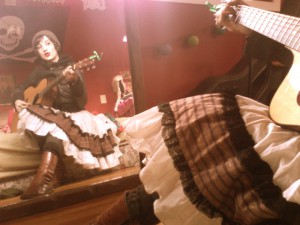 No, I was playing everywhere. I was playing in Medford. Like, Osprey.
No, I was playing everywhere. I was playing in Medford. Like, Osprey.
Do you remember your first gig?
It was at Jackass Café, I think. But that was, like—I was playing at churches and stuff and other events. The first gig I did was Jackass Café in Medford. It was like a little open mic.
But you were playing in a band in Ashland before you moved to Portland?
I was playing in a band called Romance Forgery. It was very high energy. Rock’n’roll. Really, just kids.
You played original material?
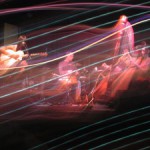
Always. And then after that Mike Kitson, the drummer we have now, and Sean Rogers, my boyfriend at the time on bass and Indeara Rose, who played concert harp. We all played together in a band called Zapato Electrico.
And that’s when we started doing music together. And then we moved to Portland and we started playing around here.
You went by the name Elena Mendoza in those days?
On my birth certificate its Luz Elena, but I have used it both ways. I went by Elena for so long because it seemed like when I was growing up it was hard to say it all together.
When did you first start writing songs?
Always. Since I was a little chipmunk. I’ve been writing since I can remember, for whatever it was worth at the time. I have no idea. I was just doing, well see, that’s one thing I never learned, I mean how do I articulate this?
Writing music and that expression has always been a part of my being, my existence. So I never knew anything else. It’s the thing that’s been the most consistent. It’s never changed. It’s only gotten—well look where I am now.
Then when did you start taking them seriously? Writing them down?
I picked up the guitar when I was seventeen, didn’t really become acquainted with it until eighteen, like actually feeling confident. Chords. I taught myself.
You know those instrumentals? CD singles’ instrumentals. R&B songs? You’d get the single and there’d be an instrumental track. Well my big thing was to write my own melodies, or my own words to other people’s music. And I was. It was awesome. It was like Cherry Garcia band, but without the drama.
Did you play any instruments before you played guitar?
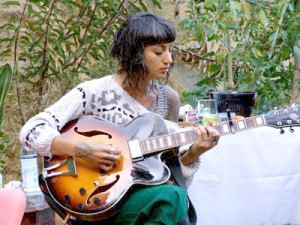
I played violin when I was little. I played the clarinet. And I played around with a keyboard that my dad got for me. A Yamaha cream colored keyboard. It had programmed beats, certain things I would write songs to, like a drum machine. So, I’d do whatever. But it wasn’t until I picked up the guitar that I actually started to put music and words and actually be manipulating the sounds and how I wanted it to be. Getting to know that part.
But I’ve always written songs, even before I had—it’s not like I was writing songs on the violin. I was a little girl.
Is your family musical?
No. They’re not musical in the sense they play instruments. But music is a really big thing in our culture. So I was around music all the time. And my dad loves music. You could sit down and talk to him and he’d tell you about the differences between boleros, mariachi songs. Different kinds of styles. He knows about time signatures. He just knows all this stuff. Because he’s moved by it. He himself would have loved to be a singer. I always mimicked–he would sing really loud at parties, to music with all the other Mexicans, and I would sing along.
How does your family feel about your being a musician? Did they approve right away?
I think when I was younger, because I’m such a fiery person– They gave me, well they rented a violin and they encouraged that, but once they saw that I started to become myself—they got kinda freaked out and they weren’t as encouraging. But that goes along with other things too. They were just really paranoid and scared for their children to be exposed to the American influence. They were pretty strict about everything. I had to sneak out to start a basketball team! So, if it wasn’t music, it was something else. But music, they were just scared that something bad was going to happen to me. And they saw how much attention I was giving it, naturally. It’s not like I told them ‘I want to do that’. They just saw it. They were trying– They didn’t know. They didn’t know how to encourage me at all.
So, now that I’m older, I’m almost thirty, my mom’s like, ‘Oh, when are you gonna get a real job’? And my dad is–the last thing he said, when I saw him last year, he was like, ‘I want you to contact Emilio Estefan so he can help you’. But before that he’s always been quiet, far-watching, not really giving me his opinion. He’s real judgmental. He doesn’t really know how to accept it. I can see that now he knows. And he knows that he knows that that’s what I’m doing.
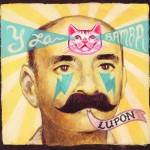
You said ‘the last thing he said’, is your dad still alive? From what I read, it doesn’t sound like your parents are still together. I read about your mom working in a sawmill.
Yeah, my pops is still alive. He lives in Atwater, California. They both have worked really hard in their lives. Still fucking going and it kills me. The sweat on their brow is what has inspired me to be who I am.
Have they ever come to hear the band?
Yes.
And you received a good response?
My pops doesn’t say much. He said something and I don’t want to say it. And that was just recently. Mostly he doesn’t— My mom’s a different story, more like, ‘You’re really doing this’? She thinks it’s funny.
How are you with them being so—
Aloof to it all? Well— I think there’s beauty behind the reality of things. There’s a reason why things happen the way they happen. For instance—I saw this Daniel Johnston interview, a documentary. They were interviewing his parents. And his parents just, like, had no idea, like how much attention Daniel Johnston was getting.
He’s just their kid.
But he was, like, a crazy kid. And he’s also a genius. But they never get it. They never spoke about it the way we get it.
I don’t know. I like it the way it is. Even though it sometimes torments me, like when I hear my mom, when I get sick, ‘Oh I just wish you had benefits’. And I’m all like, ‘Oh, I’m trying’. Sometimes it’s hard to do regular daily life things. I’m always living out— ‘Oh, we gotta create this, do this, dutta, dutta, dutta’. Then I’m hard on myself. It is what it is, right now.
I think what life is all about is to cultivate these relationships and I think with my family it’s all about convincing them of how people are perceiving me. It’s more like me evolving with the way it is. It’s something that I’m going through, trying to exist and be present with my family and life—and what it all means.
I’d think that with all the touring you’ve been doing it’s hard to maintain a center, your personal gravity.
I don’t mind touring. I love, love, love the boys in the group. We all get along. We’re all super different. But there’s this one thing that makes us jell. We all share the same ability to tap into our expression through music.
But it is hard to tour all the time and come back and be all ‘Oh, my cat’s sick’. ‘Oh, my mom’s mad or my brothers’re mad’ because the only time I get to see them is when I’m on the road and I stop in town and they get angry. They get, like, ‘You don’t make time’, for a day.
How many brothers do you have? Older? Younger? I know you’re the only daughter. Are you also the youngest?
I have three brothers—two older, one younger. Daniel Mendoza, Rolando Mendoza and Gerardo Mendoza. I am right in the middle of lovely hermanos. [Clarity lights in her eyes].
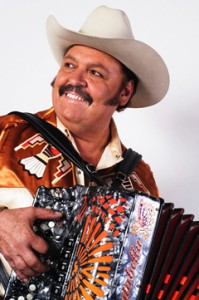
My big thing, after coming back from Mexico, my focus is, ‘Oh my gosh, I need to go back to Mexico.’ I need to be playing with these people. And I want to get closer and closer to, like, one day be on Spanish radio.
You were there recently, right?
Yeah, I just got back from being in Mexico for six weeks.
What part?
I was mostly in Mexico City. I had a friend who bought me a one-way ticket there and I just decided to go. It was really bad timing.
Bad timing?
Yeah, she just bought it and surprised me with it. So I decided to go and stayed in Mexico City. Traveled outside of Mexico City, but not that far. Saw Xochimilco, did all the tourist-y kind of things. The Pyramids of the Sun and Moon in Teotihuacán. So that, and then I hung out. I got to know the city in, like, the poorer areas, the middle class areas too and the music scene.
You’ve never been in that area before?
Well I went to Mexico City when I was a lot younger, with my parents—so not as an adult. And I don’t remember—and obviously I’m absorbing new things and my perspective is constantly being challenged and changed.
It was really cool to be staying at my friend’s aunt’s house on an old street in a barrio in Mexico City. It was humble and poorish. And the whole street, there were a lot of families that lived there for many years, a lot of generations. With them, and then leaving, and to go into the city center and have that experience. It was cool. I’m definitely going back.
Is there much of a music scene in Mexico?
The music scene there, especially Mexico City, they love music there. They love music in a way that’s different. And I know if Y La Bamba was to go to Mexico, I know people would, like, not—
They wouldn’t see you as posers?
No. We have our own aesthetic. Our delivery is different. They love music from the States. Like, you go to every single bar, you hear the Cure playing, or the Smiths. They love the Smiths.
It’s something I want to work toward. End of this year, beginning of next year or, shit, if it happens, ‘Oh, you got an international booking agent. It starts in Latin America’! Then I’m like ‘Sweet. I’m in’.
But in Mexico City there isn’t just the traditional folk. I think, in America, people are like, “Oh yeah. Mexican music. It’s ranchero, banda, cumbia’. Or if I said mariachi, they wouldn’t know the difference.
Your promotional material says some of the songs on Court The Storm reflect a mariachi style, but I didn’t really hear that.
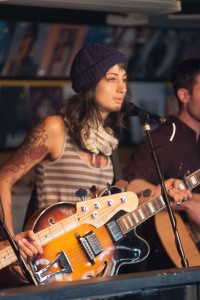
Yeah, well, we had horns and stuff. You know, it’s definitely our own thing. We add things, but different.
What I was saying about Mexico City, they have other music. The last few weeks I was there I was meeting people, went to a couple shows, got the chance to play a couple solo shows. Just by meeting those people.
And I was blown away how talented and intelligent these people are. Like, my people. The music. It’s not just the traditional folk. There’s— Check out this band called Hello Seahorse. They’re from Mexico City. Metric was playing Mexico City and Hello Seahorse opened up for them. They play with another band called Zoe.
Who were your musical influences growing up?
For the longest time, the only thing we would listen to as a family collective was Mexican music. That’s it. Classical Mexican music, folk. Everything.
And it wasn’t until junior high that I was starting to listen to hip-hop and r&b and Nirvana and the Cranberries. Northwest grunge. Totally into that, if it wasn’t Aliyah or SWV.
Any vocalist you really liked especially?
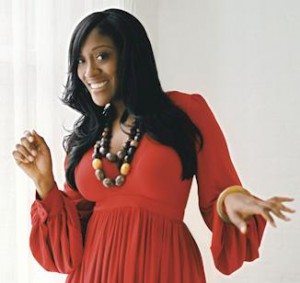
I was really drawn to the lead singer [CoKo Clemons] of SWV [Sisters With Voices]—the r&b girl trio. Loved them so much, and Aliyah, her first album [Age Ain’t Nothin’ But A Number] that came out in 1994. I used to sing along with that. This is American music. Vocalists, like Mexican? I loved Javier Solis, Gerardo Reyes, Vincente Fernandez, Pedro Infante, Jorge Negrete. When I was little I liked Selena. She really inspired me. She started the style called tejano. She was a huge inspiration. She really was. Me, as a little rascal, like growing up with my Mexican heritage, like being in America and seeing Selena. Selena was to girls my age what Lady Gaga is today.
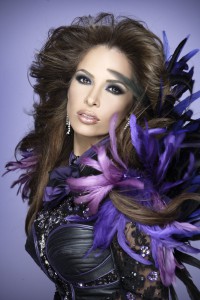
Gloria Trevi. Loved Gloria Trevi. Crazy story about that woman. Crazy scandal. But she was also a huge inspiration. She wasn’t traditional Mexican music. She was, like, rock, crazy, like, grungy rock. Back in the late eighties, early nineties. Crazy, like, awesome vocalist. With an attitude. Every girl wanted to be like her
What prompted your spiritual quest, I mean, other than questing for spiritual—
Life is messed up, man [chortling rhetorically]. I think I’ve been on a spiritual quest since I was born. When you start developing your own philosophy and know what it actually means to you. Exploring new things. Exploring life. Making sure that you’re understanding the responsibility. And I grew up Catholic. That can get confusing. But it only gets confusing when you realize it’s getting confusing.
There’s a lot of ritual in the Catholic church.
Which I’m still stuck with the ritual. I’m just working with it. What I think it means where I am now.
How old were you when you traveled to New Zealand and India?
I was twenty—and I turned twenty-one. I was twenty-one.
Why New Zealand?
Because there was a school there. Actually this certain school is like everywhere around the world. In different parts of different countries and I chose New Zealand. Because the year before I left, I went to the Salt Lake City Winter Olympics and I met a couple of kiwis there. Kids from New Zealand. It was all Christian based. And we were teaching snow boarding to little kids during the Winter Olympics. And I was there for a month and I met all these people and they talked about this program called Youth with a Mission. YWAM.
I just fell in love with the idea of New Zealand. I just saw pictures and stuff. And all I did was to save up until I actually had enough to pay for this school. It was a school of biblical studies and I went. Non-denominational. And I went by myself. I went to India. Came back to New Zealand. And I stayed longer than I was supposed to on my quest. And I came back and I never went back to the church. That’s what all of that did to me.
What was in India?
Well, it was a mission. Only five of us from the school went. And we just worked with the people on the street. We built homes for widows. We did missionary work. We worked at the Mother Teresa orphanages around Calcutta. We didn’t know anything about India. It’s huge! Especially Calcutta. I think that’s where I got sick. I was in Calcutta and Vara Nasi. Vara Nasi was the place that started to change things for me, the perspective that was in my face. I was young. I was like ‘Something’s different.’
You have said you lost your faith there. Have you regained it?
You and I were talking about Catholicism. I’ve lost— Like, you’re married. Like, you’re born into this religion and married to this faith and you’re not second-guessing it. You’re always second-guessing your motives, if you’re right or wrong. But you’re not second-guessing God itself. And it was when I was there that I started second-guessing. What type of god and the information attached to it and what it all meant. I was questioning the God that I was being taught to believe in. Versus not questioning, I was questioning other things. And that was the first time ever that I had the opportunity to– Somehow, something opened up then in India like a sponge, soaking everything in. And I’m like ‘Man, this country is so out of touch! America is so— There’s no Americans here’.
[Tears of frustration well in her eyes]
And I’m here and we’re trying to teach these people our God. But I was so distracted by all their gods and their rituals and the way they. And all that stuff. Just quietly turned off. I sub-consciously turned off. I was just with the people, seeing the people. What they did. What they ate. How they ate, why they ate. Why they prayed to their gods. How many gods. What are all their names?
The poverty. The wealth. I was just so conflicted. When I got back to New Zealand I decided to still do the school of biblical studies. And I did it and we, like, read the whole Bible. I read every single book. We studied certain words in each book, because it changed the context. Like ‘love’. I can’t even articulate everything I learned. We did that, and like slowly but surely, because I made an effort and I wanted to learn more. I just became more—depressed. [Very sadly].
So I came back to the States after being gone a total of eleven months from America, not knowing what the heck to do.
I remember ordering these books on tape about creation versus evolution. So I was into that kinda thing. It was like—‘Oh, I need to know more’. I was stepping outside. I listened to a Bright Eyes album, like obsessively, around that time. Lifted… [Lifted or The Story is in the Soil, Keep Your Ear to the Ground]. And the album helped me not– I just stopped going to church. And I just listened to the album over and over and over again.
That became your church.
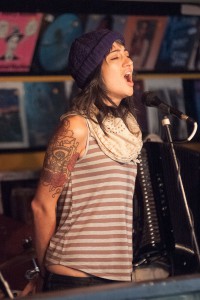
Totally. And I was really depressed that I couldn’t go back to church and feel the same high that I did before. I was like—‘why did the universe take this away from me’? I had been so happy. I was on a mission.
I was pissed off. I was mad at everything. And there were certain events that happened. Because I’m intense. When I fall in love, I fall in love. When I commit, I commit. And I’m faithful. Therefore I was faithful and committed and in love and I was like totally doing the work to be what I was being taught to be under the Christian religion. But I grew up Catholic. I did the whole Christian thing on my own.
Yeah, it was a heartbreaking thing. It was like divorcing my love.
It seems like that turmoil is still coming out in your music.
Oh yeah. Sure
Do you have any specific goals for yourself or for the band, going forward? From music, the music business, or a career. I hate that word.
What I would like to see, because we all have invested so much in doing this, but not– I think the original intention was just to have fun and hang out with homies. I mean, take it seriously for the sake of taking someone’s expression seriously. And because this is something I’ve always done, I’m always going to be doing what I’m doing. We have this intention and we’re at where we’re at.
What do I want out of the music business? Shit man, I don’t know. It’s flighty. Who knows what could happen? All I want is some sort of mental stability and perspective constantly, and just to grow. It’s just a growing experience, you know?
Do you see yourself as being a singer—a professional musician—all your life?
[Long pause]
Well, in this context— It’s so hard to answer that, because— I can see myself doing what I’m doing now, but it’ll change, I’m sure.
If you weren’t singing, what would you be doing?
Probably be dead.
Oh! That’s not the answer I anticipated.
I’m so dramatic. I don’t know how to answer that, because I don’t know anything else. To be honest with you, right now, because we have down time right now, I’m like ‘what the fuck am I doing’? ‘What the fuck am I gonna do’? And everyone’s encouraging me: ‘No. This is what you’re supposed to be doing’. Well I know this is what I’m supposed to be doing, I’ve been doing it my whole life. Now I’m getting old. Like, what am I doing? I’m scared. You know? It’s kind of a scary thing. But this is my perspective. And I’m hoping, like, that something changes, but it’s up to me. But that’s because I’m sensitive and emotional. I hope that I’m able to understand the music business well enough where I’m not so aloof to it. And get really upset, and not know how to—like, because the business— I’m not, like, a business oriented person.
I’ve frequently contended that it’s called the ‘Music Business’ for a reason. Capital M, capital B. Most capital M musicians are terrible capital B businessmen and vice versa.
When I see musicians who are business oriented, and they’re good musicians, and they’re doing really well, I’m like, ‘why is it that I can’t be…’ For instance, we’re supposed to be turning this thing in, and there’s a deadline. I have no idea what the fuck it is. And there’s a deadline today at one [within about forty-five minutes] and it’s my fault, because it’s hard for me to understand all these little nooks and crannies of what you’re supposed to get done and, like, I don’t know and I always beat myself up for it because I don’t know how to do that. If you were to ask me if I see myself as a professional musician, I would like to learn how to be that, but I don’t consider myself as a professional, like it’s my profession. I still don’t consider myself like that. I don’t. I need to learn to understand all that and then maybe, you know? Once I understand it, maybe we can talk and I’ll answer you. Do I want to do this? I don’t know. I’m doing this because it’s all of this. And it’s, like, my family. Like writing—I see my mom and my dad and my brothers—
That really comes across.
Well there’s so many things coming up to the surface all the time.
If you look at popular music in general—most of it is pretty shallow. There’s not a lot of that introspection out there.
Well, those people are really good at the business side of things and they really know how to work it.
[Returning to the original question]
I mean, I’m gonna try. It’s not like I’m gonna sit there, ‘Oh woe is me. Blah, blah, blah’. And there’s people—we’re helping each other and there’s people in the band and like that who know how to do certain things that the others don’t know.
But it can be draining, because then those people get stuck doing that shit all the time. I’m trying to learn how to do all that.
Why?
Because I have to. Because other people are not going to—
Is that what they say? Or is that what you—
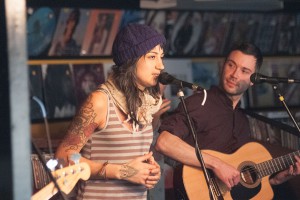
I can’t just sit there. And I do that. I do just sit there and, like, ‘Oh, they’ll figure it out. They’ll figure it out because I don’t know how’. It’s enabling me. I should at least try to learn. And I am. But it’s so hard. I mean, interviews and like that. I don’t mind interviews. At least they don’t have to do the interviews and I do. Paul’s [guitarist Paul Cameron] in the same boat. Paul and I—we’re just like ‘I don’t know what’s going on’.
Like, I’ve had this job right down the street at Zilla. I’ve been working there the past four years. And it’s, like, a family business. We’re all family there. We’re like super tight. They’ve been really, really nice about my touring schedule. I come back and I always have a job—that security. This year, however, because of how much I’ve been gone, and I took that personal trip to Mexico [the aforementioned “bad timing”]. I don’t have a full schedule there anymore. So the reality check is, I’m only working there two days a week.
And everybody knows in this town that we’re in a band, and that, if we were trying to get another job—like, it’s hard to find a temporary job. And, like, that’s where we’re at right now.
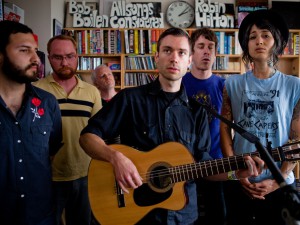
So, trying to be psychologically stable. And be like, “Okay, is this going to work’? And try to figure out how to pay rent and have food on. It’s a reality. Eric [accordion], he has a family, but he also has a job where he can, like, leave and do it on the road. So can Mike [drummer]. And Scott [percussion]—he has so much work. He’s a DJ. He can do so much stuff. Then, as for me, I mean, I can, like, do what I do there, but really, my job is to wake up in the morning, and, like, play my guitar and, like, be really hard on myself and rewrite it five times and then ask Paul to come over and we just play and then we’re supposed to be looking for a job. Chances are they’re not going to hire us, because we’re…
Because you’re flakes [Sarcstically].
Well, not like that! We can’t— We’re like, ‘Oh yeah, can you hire us, but we’re gonna be gone all of March. But we’ll be back in April. And maybe in May we’ll be gone for two weeks’. So how do I make that work? I don’t know. It’s not like I have anything to compare it to. I’m adding it to my adult learning experience memory files. Maybe next time I’ll learn how to do it better.
You still have a long way to go. You’re not…
If this works— I’m just being blunt. But it’s all coming. At the end.
You know, I think you and the band have a real bright future. Just keep doing what you’re doing and trust your musical instincts. I think you’re on to something.
Thank you. That’s really encouraging. We’re all just homies trying to get by and stay true to our expression and not be so hard on ourselves. Keep confidence and keep doing it.
When did Paul join the band?
Two years ago. That’s so crazy! Two years ago. Yeah. But the band as a whole has been together for five years.
But some members who were on Lupon left after it was recorded, right?
Just one. It was David Kyle[David Kyle and the Invisibles, The Shadow Grounds], the guitarist.
And what happened to Sean Flinn?
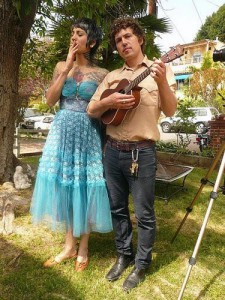
Sean has his own project [Sean Flinn & the Royal We]. And what happened was that both of the bands were receiving similar attention at the time and there were scheduling conflicts and Ben Meyercord and myself were singing with Sean too.
We had to make a very conscious decision and try to do what was best for both projects—he should focus on his stuff and we should focus on ours. You know what I mean? Here in Portland everyone’s playing in everyone’s band and it gets frustrating, but at the same time. How can you not? You’re constantly inspired. And then we’re all super-sensitive on top of that.
Super-sensitive musicians. Imagine that!
We take it to a whole new level. There’s plenty of things to be— Things are pretty intuitive.
Your vocal blend with Paul is amazing in places on Court The Storm. ‘Hughson Boys’.
On ‘Hughson Boys’, when we originally wrote it, we had this vocal blend. It was synchronized and smooth. Then after performing it for some time, we kind of lost the original way we sang it. Then when we recorded it, I remember Paul pulled me aside, and he said let’s try to sing it like we did at first. And we were really in tune and we ended up doing it live together in the studio. That was awesome!
Well the thing about the Beatles and the Beach Boys and the classic r&b vocal groups of the ‘60s was that they all sounded related when they sang. Their harmony and blend was that close. It sounded like family members and you two sound like family members.
We are!
How did you guys hook up with Neko Case?
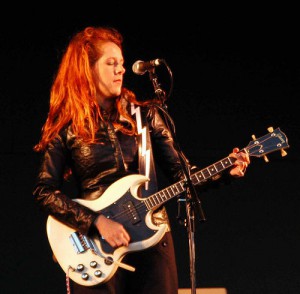
Neko Case was on a personal trip. She came to Portland. And she was hanging out, you know? Whatever. On her own. She got tattooed. And she was downtown strolling around and she walked into Tender Loving Empire, looking at the music and our album was playing in the store. This was, like, September of two years ago. She was, like, ‘Who is this’? ‘Oh, it’s Y La Bamba, duh duh duh. They’re record is actually coming out next week’. [Lupon was released in late September 2010]. So she buys it and tweets about it. And she’s ‘Oh my God. Portland music lover’. Blah, blah, blah. And then next day we got an offer to tour because of that. I had friends say, ‘Did you see? Neko tweeted about you’. It went from that to the next day to the next day. It was pretty cool. Last year was really a good year for us. And we didn’t have this album out yet. And Neko did sing on one song, ‘Court the Storm’.
I can hear a bit of attitude in places toward the end of the album. There’s that energetic, more traditional…
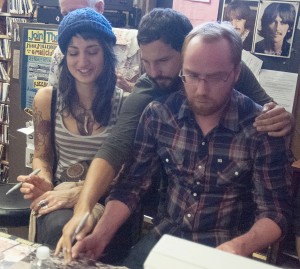
‘Viuda’. I love playing that one live. We all love it. It’s our jam. [laughs]. One of my favorite songs is ‘Idaho’s Genius’. Ben Meyercord sings lead on that.
I like ‘Bendito’ a lot.
That song’s fun. It’s going to be our second single. The first one is ‘Squawk’. On the twenty-eghth [February 28th],the day of our CD release, ‘Bendito’ is going to be released on Latin I-Tunes. And that is exciting and I hope that that song, and I don’t hope for much, but I hope that song reaches Mexico City. I hope something happens. I hope something is manifested with that tune. If it doesn’t, whatever, oh well, I’ll do what it does. Whatever it wants to do. It’s just because I got back from Mexico and I feel so inspired.
Can you say something about the polyrhythms and polymeters on the new album? Court the Storm is rampant with that stuff.
Just wait ‘til the next album! We have like, ‘River in Drought’, ‘Clarijs,’ and ‘Pictures of a Dog’.
Did you record this album here in Portland?
Yeah. I think it’s called Acoustic Alchemy [Audible Alchemy]. Alchemy Studio on Mississippi.
And Steve Berlin’s [Los Lobos, producer of Court the Storm] in Portland now?
Yes. Yeah, he has his family here and stuff. His daughters live here. He has a beautiful family.
How did you guys run into him?
There was a New Seasons thing— Mississippi Studios? The album release for the last album. That’s when I first met him. From there he was like homie.
Any plans to go back into the studio?
We have this thing we really want to do it this year. An EP with Nick Delffs. Old Shaky Hands? We wanna do stuff with him somehow. We wanna do at least an EP this year. I would love to and I think the band wants to too. Keep the momentum and the stamina going.
You guys all seem very free of ego.
You should see us all on tour. In the van, they’re always doing Scrabble and nerdy nerd. And I’m, like, in the back—
Worrying about everything?
[She laughs sheepishly]
We all want to take care of each other and understand the fruits of life. It’s what makes us human—to create and be inspired. One van, one girl, five dudes, crossword puzzles, coffee, herbs, and limes.
